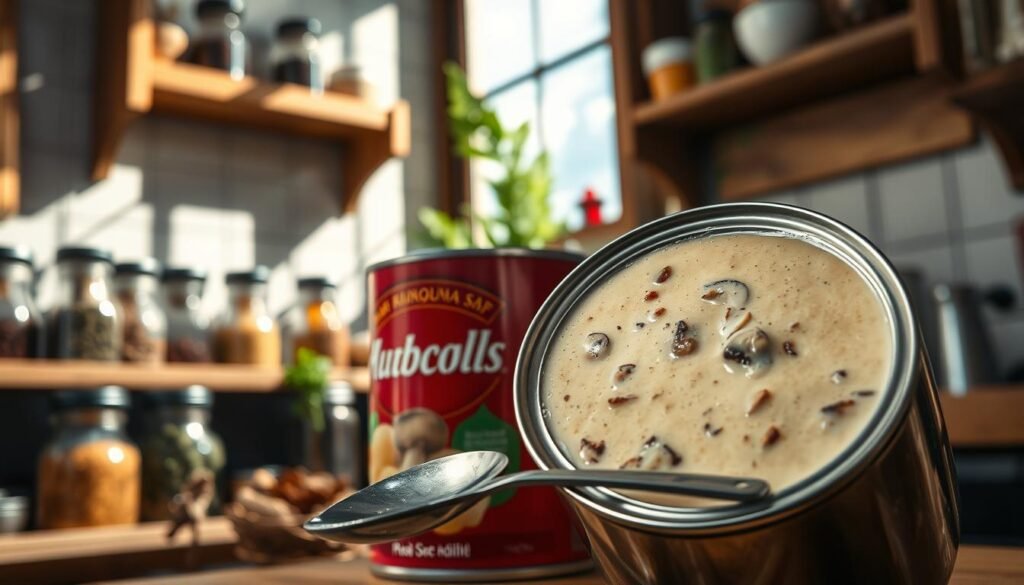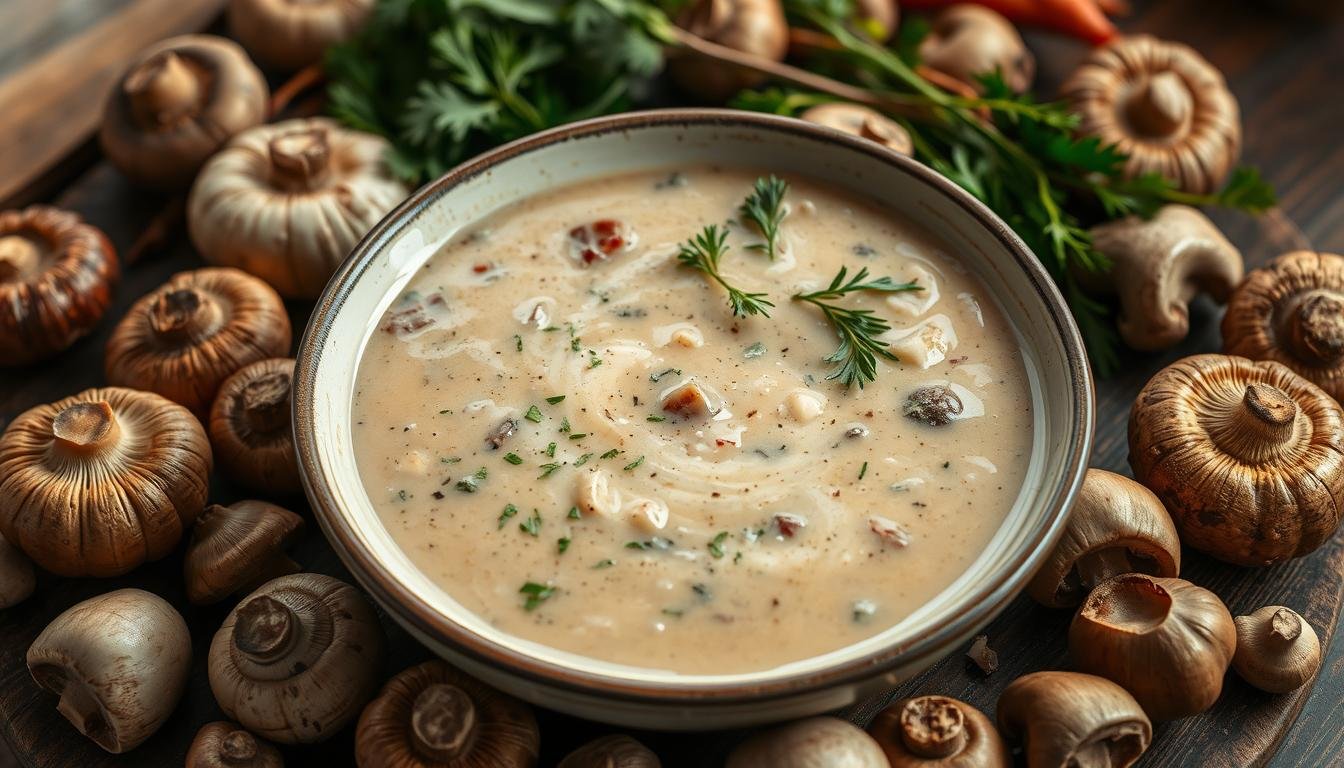Ever wondered why some folks can’t enjoy mushroom soup? It’s because of health reasons. As a professional copywriter, I’m here to share surprising facts about commercial mushroom soups.
Imagine a meal choice could cause a severe allergic reaction or worsen a health issue. That’s true for many health-aware people. In this article, we’ll explore why mushroom soup might not be good for you1.
Key Takeaways
- Commercial mushroom soups often have less than 12% real mushrooms. The rest is water, flour, and additives.
- These soups may include genetically modified ingredients like canola oil. They also have artificial flavors, preservatives, and colorings.
- The cans might be lined with Bisphenol A (BPA), a chemical that could harm your health.
- Mushrooms are a common allergen. People with dietary restrictions should avoid mushroom-based products.
- Making your own mushroom soup is a healthier choice. You can control what goes into it.
Contents
- 1 Understanding Common Ingredients in Commercial Mushroom Soups
- 2 The Truth About Canned Mushroom Soup Components
- 3 Health Implications of Processed Soup Ingredients
- 4 Why You Can’t Have Mushroom Soup: Medical Considerations
- 5 Understanding Mushroom Nutritional Benefits
- 6 Common Allergens in Commercial Mushroom Soups
- 7 The Role of Mushrooms in Disease Prevention
- 8 Dietary Restrictions and Mushroom Soup Consumption
- 9 Making Healthier Homemade Mushroom Soup Alternatives
- 10 Natural vs. Artificial Mushroom Flavoring
- 11 Understanding Food Labels and Ingredient Lists
- 12 FAQ
Understanding Common Ingredients in Commercial Mushroom Soups
Commercial mushroom soups often have ingredients that surprise us. Brands like Campbell’s Cream of Mushroom Soup include many additives and preservatives. These can be a concern for those on a vegan, vegetarian, gluten-free, or allergen-free diet.
Hidden Additives and Preservatives
Looking at Campbell’s Cream of Mushroom Soup, we find artificial flavors and yeast extract. These are sources of MSG. There’s also caramel III coloring2. These additives help with flavor, shelf-life, and appearance.
Percentage of Real Mushrooms Used
Many commercial mushroom soups have a low mushroom content. Campbell’s Cream of Mushroom Soup has only 12% mushrooms2. The rest is fillers and thickeners. This might not meet the expectations of health-conscious eaters.
Quality Concerns in Mass-Produced Soups
Mass production of mushroom soups can lead to quality concerns. These soups may have refined ingredients and GMOs2. This is a problem for those with specific dietary needs.
Knowing what’s in commercial mushroom soups helps us make better choices. By understanding the additives, mushroom content, and quality issues, we can choose healthier options2.
The Truth About Canned Mushroom Soup Components
Canned mushroom soup often hides the truth behind its labels. These soups may use low-quality ingredients that don’t fit your diet3. Even though they’re convenient, knowing what’s inside can reveal health risks.
Many canned soups, like Campbell’s, start with canola oil4. This oil is often genetically modified and loses its nutrients. They also use maize starch for thickening and refined salt with additives5.
Soy protein, which can be bad for you, is in many canned soups5. These soups might also use up to 48 chemicals for flavor5. This can harm your health and taste.
If you have special menu requests, restaurant accommodations, or allergies, check the ingredients. Knowing what’s in canned mushroom soup helps you choose better.

“The truth is often hidden behind the glossy labels of canned mushroom soups.”
Health Implications of Processed Soup Ingredients
Canned or packaged mushroom soups might seem easy to grab, but their ingredients can be a worry. Chemical flavorings, artificial colors, and preservatives are just a few things to watch out for. It’s important to know what’s in these soups.
Effects of Chemical Flavoring Agents
Many processed soups use a mix of chemical flavorings. Some soups have up to 48 different chemicals6. These can mess with our body’s natural ways and might cause health problems.
Impact of Artificial Colors and Preservatives
The bright colors in some soups come from artificial dyes. For example, caramel III has been linked to cancer in lab tests6. Preservatives like sodium benzoate also raise health concerns.
Concerns About BPA in Can Linings
BPA, or bisphenol-A, is found in many canned soup linings. A 2011 study by Harvard found that canned soup can increase BPA levels by over 1000% in just 5 days6. BPA can harm development and heart health, especially in young kids.

These issues with processed mushroom soups are big for people with dietary needs. Knowing the risks helps us choose better soups that fit our diets67.
Why You Can’t Have Mushroom Soup: Medical Considerations
Mushrooms are known for their health benefits, like boosting the immune system and reducing cancer risk8. But, some people can’t have mushroom soup because of allergies, sensitivities, or dietary rules.
For those with food allergies, mushroom soup can be risky. Mushrooms are a common allergen that can cause serious symptoms9. Also, many mushroom soups have additives and preservatives that can make allergies worse.
People on special diets, like those with food intolerances or strict dietary restrictions, should avoid mushroom soup. Conditions like Irritable Bowel Syndrome (IBS) or Crohn’s disease can get worse with mushrooms9. It’s important to find mushroom-free recipes or soup substitutes for their health.

There are many mushroom-free recipes and soup substitutes out there. They offer the same comfort and nutrition as mushroom soup, but without the health risks. These alternatives let people with dietary restrictions or allergies enjoy soup while staying safe and healthy.
Understanding Mushroom Nutritional Benefits
Mushrooms are more than just food. They are packed with nutrients that help those on vegan diets, with allergies, or with special dietary needs. They have antioxidants and boost the immune system, making them a great addition to any diet.
Antioxidant Properties
Mushrooms have a compound called ergothioneine, which may fight cancer. Eating 18 grams of mushrooms daily, or about two medium ones, can cut cancer risk by up to 45%10. They also have very little sodium, which is good for your heart and blood pressure10.
Immune System Support
Mushrooms are full of vitamins and minerals that keep your immune system strong. They have selenium, vitamin D, and vitamin B6, all important for a healthy immune system11. Eating more than two cups of mushrooms a week can also lower the risk of mild cognitive impairment10.
Cancer-Fighting Properties
Mushrooms are known for their ability to fight cancer. Their antioxidants and support for good gut bacteria can help prevent cancer11. Even replacing half of the meat in a recipe with mushrooms can cut down sodium intake by 25%, improving health10.
Adding mushrooms to your meals can bring many health benefits. They support vegan diets, are good for those with allergies, and help with special diets. Mushrooms are a powerful superfood that should be a key part of a healthy diet1011.
Common Allergens in Commercial Mushroom Soups
Commercial mushroom soups often have common allergens. Wheat flour is a big problem for those on gluten-free diets12. Soy protein can also cause allergic reactions in some people. And, dairy products like milk or cream are used, which is bad for those with lactose intolerance or milk allergies12.
Some soups have monosodium glutamate (MSG) from yeast extract12. This can make people feel sick, with symptoms like headaches and skin issues. Artificial colors, like annatto (160b), can also cause health problems in some12.
If you have dietary restrictions or food sensitivities, always check the labels on mushroom soups. Making your own soup at home is a better, healthier option12.
Mushrooms themselves are usually safe, but commercial soups can have extra allergens and health risks13. It’s key to be careful and know what you’re eating, especially if you’re sensitive or have health issues13.
“The recommended approach is never to eat a mushroom unless its identification is certain.”13
The Role of Mushrooms in Disease Prevention
Mushrooms are more than just a tasty ingredient. They have amazing health benefits, especially in preventing diseases. They can help lower cancer risk and keep your heart healthy. Mushrooms are truly amazing for your overall health.
Cancer Risk Reduction
Eating mushrooms can lower your chance of getting some cancers. Just 18 grams a day can cut cancer risk by up to 45%14. Mushrooms are full of antioxidants and compounds that fight off harmful free radicals.
Cardiovascular Health Benefits
Mushrooms are good for your heart too. Shiitake mushrooms, for example, can help lower cholesterol and blood pressure14. They also have potassium, which is great for your heart and blood pressure15.
Mushrooms may also protect against diseases like Alzheimer’s and Parkinson’s15. Adding mushrooms to your diet can help prevent diseases and keep you healthy.
“Mushrooms are truly a powerhouse when it comes to disease prevention. Their unique nutritional profile and bioactive compounds make them a valuable addition to any healthy diet.”
Want to lower cancer risk, improve heart health, or keep your brain sharp? Mushrooms can help. Next time you’re cooking, add more mushrooms to your dish141516.
Dietary Restrictions and Mushroom Soup Consumption
For those with dietary restrictions, commercial mushroom soups might not be the best pick. Vegans and vegetarians should check the ingredients for animal products. Those on a gluten-free diet must avoid soups with wheat flour or gluten.17
Diabetics should watch out for added sugars and starches in canned mushroom soups. Even low-sodium soups can have a lot of salt, which is bad for those who limit sodium.17
For GERD sufferers, the situation is complex. A 2019 study in China linked soup to GERD flare-ups, due to soup temperature and how fast it’s eaten.17 Yet, a 2018 study found that eating miso soup daily could reduce GERD symptoms, regardless of age, sex, or BMI.17
Some ingredients in soups, like tomatoes and spices, can make GERD worse. Foods like high-fiber veggies and lean meats are better for GERD.17
In short, while mushroom soup might look appealing, those with dietary restrictions or health issues should be careful. Always check the ingredients to ensure safety and health.
“Proper food preparation and storage are crucial in maintaining the safety and quality of mushroom soups, especially for those with compromised immune systems.”
Making Healthier Homemade Mushroom Soup Alternatives
Canned mushroom soups might not be the best choice for health. But, making your own at home is easy and tasty. You can pick clean ingredients and prepare it right to meet your dietary needs. This includes keto or pregnancy-safe options.
Clean Ingredient Selection
Begin with fresh, top-quality mushrooms. Add onions, garlic, and herbs for flavor. A bit of white or green tea adds antioxidants18. For creaminess, use yogurt or olive oil instead of heavy cream.
Preparation Methods
A healthier homemade soup avoids artificial additives and preservatives18. Preparing it from scratch lets you control what goes in. It’s quick, taking under 15 minutes18.
Homemade mushroom soup tastes better than canned and is healthier18. It’s also more customizable18. You can keep it in the fridge for 3 to 4 days18. But, it’s best not to freeze it to avoid texture changes18.
By following these steps, you can make a delicious, healthy mushroom soup. It fits your dietary needs, whether keto or pregnancy-safe18. You have full control over what goes into your meal, ensuring it’s both comforting and good for you.
Natural vs. Artificial Mushroom Flavoring
The flavor of mushroom soup really matters. Some soups say they have “natural mushroom flavor,” but often, they use artificial stuff instead19. This can be bad for those on a keto diet or with diverticulitis because these fake flavors can mess with your gut or throw you out of ketosis.
Natural mushroom flavor comes from real mushrooms. Homemade mushroom powder, for example, is not only tastier19 but also better for you. It’s made from dried mushrooms like porcini or shiitake, mixed with spices like garlic and onion powder19.
Artificial mushroom flavor, however, is made in labs. It can have up to 48 different chemicals20. These synthetic compounds may include solvents, preservatives, and other harmful substances not found in real mushrooms.
“While natural mushroom flavoring can enhance the nutritional profile of your soup, artificial flavorings may undermine your health goals.”
Choosing natural mushroom flavor means you get a better taste and health benefits19. So, when you want creamy mushroom soup, pick a recipe that uses real mushrooms. This way, you enjoy the true flavor and health perks of mushrooms.
Understanding Food Labels and Ingredient Lists
When considering can cats eat mushroom soup, it’s key to read food labels well. I first check the percentage of real mushrooms in the soup. Some labels might say “natural flavors”21 instead of the real amount, so I always check the ingredients list closely. can cats eat mushroom soup
I also look out for allergens like wheat, soy, and dairy. I avoid artificial preservatives and colors too. “Yeast extract” might mean MSG is present, which I try to steer clear of22. It’s also important to watch the sodium levels, as some soups have a lot, with 1/2 cup having up to 810 mg23. The American Heart Association suggests keeping sodium under 1,500 mg a day for most people23.
By carefully reading labels and ingredient lists, I can choose better can cats eat mushroom soup options. This way, I avoid harmful additives and get the good stuff from real mushrooms in my soup21.


